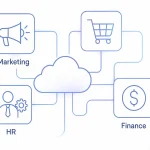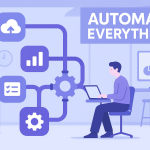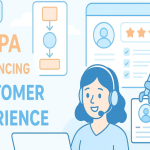OpenRPA: Complete Guide to the Open-Source RPA Platform

OpenRPA is one of the most promising RPA tools available today. While enterprise-grade RPA platforms like UiPath, Automation Anywhere, and Microsoft Power Automate dominate the market, they often come with high licensing costs. OpenRPA provides a powerful alternative for businesses and developers who want enterprise-level automation without the heavy price tag.
In this blog, we’ll explore everything you need to know about OpenRPA: what it is, how it works, its features, benefits, integrations, pricing, and whether it’s a good fit for your business.
What is OpenRPA?
OpenRPA is an open-source Robotic Process Automation platform that enables businesses to automate repetitive tasks using software robots. Built with scalability and flexibility in mind, OpenRPA allows both technical and non-technical users to build automation workflows, integrate APIs, and connect with AI services.
Unlike many open-source projects, OpenRPA has been designed as a full-fledged enterprise automation platform, including features like orchestration, security, and advanced integrations.
👉 In short, OpenRPA brings the power of commercial RPA platforms into the open-source ecosystem.
How Does OpenRPA Work?
OpenRPA works on a client-server architecture:
- OpenRPA Client – The desktop application where workflows are designed.
- Drag-and-drop workflow designer.
- Support for scripting and advanced logic.
- OpenFlow (Orchestrator) – Manages bots, workflows, and users.
- Cloud-native orchestration engine.
- Built-in access control, logging, and monitoring.
- Bots – Execute the workflows across applications.
- Can work with desktop apps, APIs, or cloud-based platforms.
Key Features of OpenRPA
- Open Source & Free – No license fees, making it cost-effective for small businesses and startups.
- Cross-Platform Support – Automates Windows applications, web apps, and APIs.
- Drag-and-Drop Workflow Builder – Visual design for non-technical users.
- Extensive Integrations – Works seamlessly with Node-RED, IoT devices, and AI/ML platforms.
- Security & Governance – Built-in authentication, role-based access, and audit trails.
- Scalability – Cloud-native orchestration with OpenFlow supports enterprise use cases.
- Community Support – Active developer community with plugins, forums, and open discussions.
Benefits of Using OpenRPA
- Cost-Effective
Unlike commercial tools, OpenRPA is free to use. Businesses only pay for infrastructure or optional support. - Flexibility & Customization
Developers can extend functionalities, integrate APIs, and tailor workflows to unique business needs. - Enterprise-Ready
Comes with orchestration, access control, and security features typically missing in open-source tools. - AI & IoT Integration
Native integration with Node-RED allows automation of IoT devices and connection to AI services like TensorFlow or OpenAI. - Scalable
Can grow with your organization, from small pilots to enterprise-wide deployments.
👉 Need help setting up OpenRPA? Our experts at DecaSoft Solutions provide better solutions compared to others, ensuring your automation journey is smooth and future-ready.
OpenRPA vs Other RPA Tools
| Feature | OpenRPA | UiPath | Automation Anywhere | Power Automate |
|---|---|---|---|---|
| Cost | Free (open-source) | High | High | Medium |
| Ease of Use | Moderate | High | Moderate | High |
| AI/IoT Integration | Strong (via Node-RED) | Strong | Medium | Limited |
| Community Support | Growing | Large | Large | Large |
| Best Fit | Startups, developers | SMBs + Enterprises | Enterprises | Microsoft users |
Use Cases of OpenRPA
- Finance: Automate invoice processing and reconciliations.
- Healthcare: Streamline patient record management and claim processing.
- Customer Service: Handle ticket creation, data entry, and chatbot integration.
- IT Operations: Automate password resets, system monitoring, and reporting.
- IoT Automation: Integrate with sensors and devices for real-time process automation.
Pricing of OpenRPA
OpenRPA itself is free and open-source.
- Community Users: No cost to download and use.
- Enterprises: May choose to pay for managed services, enterprise support, or cloud hosting (via OpenFlow).
👉 This makes OpenRPA ideal for startups and SMEs looking to adopt automation without high upfront costs.
Challenges of OpenRPA
- Requires more technical expertise compared to drag-and-drop commercial tools.
- Community support is smaller compared to UiPath or Automation Anywhere.
- Enterprises may need to invest in additional support services.
Future of OpenRPA
As businesses look for affordable and flexible automation, OpenRPA is positioned to become a major player in the open-source automation ecosystem. With strong backing from its community and integration with cutting-edge technologies, OpenRPA is expected to expand its features and enterprise adoption by 2030.
Final Thoughts
OpenRPA is not just another open-source project—it’s a serious enterprise-ready RPA platform. For businesses that want the flexibility of open source without sacrificing enterprise features like security and orchestration, OpenRPA is a great choice.
At DecaSoft Solutions, we help businesses evaluate whether OpenRPA or commercial RPA tools are the right fit. With our expertise, you get not just automation, but smarter, future-proof solutions.
👉 Need help to understand OpenRPA better? Contact DecaSoft Solutions today and let our experts guide you toward the right automation strategy.




